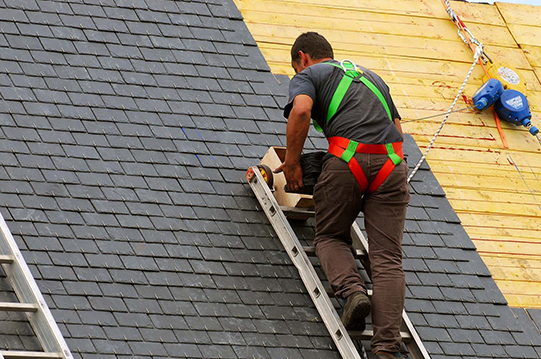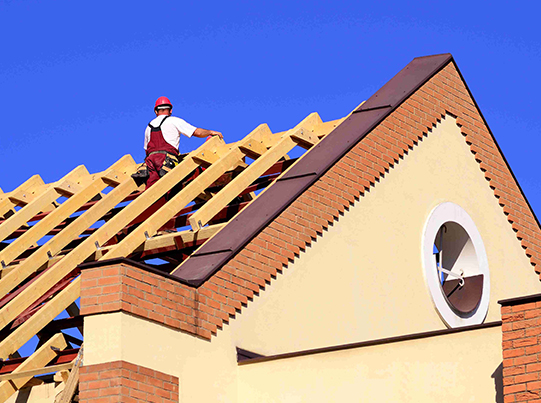When working with Residential Roofing in Sunland, it is important to know about current trends. This would help you to increase the value of your property by giving it a modern look. Here are some of the current trends you should be aware of

Sunland residents are increasingly opting for energy-efficient roofing materials and technologies to reduce energy consumption and lower utility bills. This includes using cool roofs that reflect sunlight and absorb less heat, as well as incorporating insulation and proper ventilation systems to improve energy efficiency.
With a growing focus on sustainability, homeowners in Sunland are considering environmentally friendly roofing options. This includes using recycled or eco-friendly materials, such as metal roofs, which are highly durable and recyclable. Additionally, solar panels integrated into roofing systems are gaining popularity as renewable energy solutio

Sunland residents appreciate modern and contemporary design elements in their homes, and roofing is no exception. Flat or low-slope roofs with clean lines and minimalist aesthetics are sought after, as they complement modern architectural styles and provide a sleek, sophisticated look.
Given the exposure to the Southern California climate, Sunland homeowners are looking for roofing materials that can withstand the region’s specific challenges. Impact-resistant shingles and durable roofing materials, such as concrete tiles or metal roofs, are popular choices for their ability to withstand high winds, extreme temperatures, and potential debris impact.

Click on the button and get a free estimate for the services of the best roofing contractors in Sunland
Your roof can have a wide range of issues. Different issues have different solutions. Here is a table with some of the common issues and their solutions
| Roofing Issue | Ideal Solution | Cost Range (Approximate) |
|---|---|---|
| Leaks | Roof repair/replacement | $300 – $10,000 |
| Shingle Damage | Shingle replacement | $100 – $500 per square |
| Roof Ventilation | Installation of vents | $300 – $1,500 per vent |
| Blistering | Roof membrane repair | $500 – $2,000 |
| Loose or Missing Flashing | Flashing replacement | $200 – $600 per section |
| Structural Damage | Roof reinforcement | $1,000 – $10,000+ |
| Ageing Roof | Roof replacement | $5,000 – $30,000+ |
When considering materials for residential roofing in Sunland, several options are suitable for the region’s climate and architectural preferences. Consult our experienced roofing contractors in Sunland, to get the best solutions. Here are some ideal roofing materials
Concrete tiles are a popular choice in Sunland due to their durability, longevity, and resistance to fire and extreme weather conditions. They can withstand the intense heat and provide excellent insulation. Concrete tiles also offer various styles and colors, allowing homeowners to achieve the desired aesthetic for their homes.
Clay tiles are renowned for their timeless appeal and excellent heat resistance. They can withstand high temperatures and provide natural insulation. Clay tiles are also durable and can last for several decades with proper maintenance. They offer a classic and elegant look, enhancing the overall curb appeal of homes in Sunland.
Asphalt shingles are a cost-effective option for homeowners in Sunland. They are versatile, available in different styles and colors, and can complement various architectural designs. Asphalt shingles are relatively easy to install and offer good protection against the sun’s UV rays and moderate weather conditions.
Metal roofs, such as steel or aluminium, are gaining popularity in Sunland due to their durability, energy efficiency, and contemporary appearance. Metal roofs are lightweight, fire-resistant, and can effectively reflect sunlight, reducing cooling costs. They can withstand strong winds and have a long lifespan, making them a practical choice for homeowners.
Synthetic roofing materials, such as composite shingles or rubber roofing, offer a blend of durability, versatility, and affordability. These materials can mimic the appearance of natural materials like wood shakes or slate, providing an aesthetic appeal while being more budget-friendly and requiring less maintenance.
You need to get roofing permits before starting to work on residential roofing in Sunland. Get complete support to get all the required permits. Here is the process that needs to be followed.
Start by familiarizing yourself with the local building codes, regulations, and permit requirements specific to roofing projects in Sunland.
Gather the required documentation for the permit application. This may include detailed plans and specifications of the roofing project, including materials to be used, roof dimensions, and any structural modifications.
Fill out the roofing permit application form provided by the local building department. Include all relevant project details, such as property address, homeowner information, contractor details (if applicable), and scope of work.
Submit the completed application along with the required documentation to the local building department. Ensure that all necessary fees are paid at the time of submission. Some jurisdictions may accept applications online, while others may require physical submission.
The building department will review your application, plans, and documents to ensure compliance with building codes and regulations. This process may take a few days to several weeks, depending on the workload and complexity of the project. They may request revisions or additional information if needed
Once the permit application is approved, you will receive the roofing permit. This permit authorizes you to proceed with the roofing project within the approved guidelines. Ensure that you have the permit readily available at the project site for inspections and verification
Throughout the roofing project, inspections may be required at various stages, such as after the installation of underlayment, flashing, or the completion of the entire roof. Contact the building department to schedule inspections as per their requirements. Inspections help ensure that the work is being done in accordance with the approved plans and building codes
Hiring an insured roofing contractor offers several important benefits and provides you with peace of mind throughout your roofing project. Here are some key reasons why you should consider hiring an insured roofing contractor:
Liability Protection: Roofing work involves inherent risks, including the potential for property damage or personal injury. By hiring an insured contractor, you protect yourself from potential liability in case of accidents or mishaps during the project. If any damage occurs to your property or if someone is injured, the contractor’s insurance coverage can help cover the costs and protect you from potential lawsuits.
Financial Security: An insured roofing contractor carries liability insurance and workers’ compensation insurance. Liability insurance covers any damage to your property caused by the contractor’s work, while workers’ compensation insurance covers any injuries sustained by the contractor’s employees while working on your property. Having insurance coverage ensures that you are not held financially responsible for such incidents.
Professionalism and Reliability: Insurance is a mark of professionalism and reliability in the roofing industry. It demonstrates that the contractor takes their work seriously, is committed to protecting their clients’ interests, and is prepared to handle any unforeseen circumstances. An insured contractor is more likely to follow safety protocols, adhere to industry standards, and provide high-quality workmanship.
Quality Assurance: Insurance coverage often requires contractors to meet certain qualifications and standards. By hiring an insured roofing contractor, you can have confidence in their expertise and capabilities. Insured contractors are more likely to have the necessary licenses, certifications, and training, ensuring that they are knowledgeable about the latest roofing techniques and practices.
Peace of Mind: Knowing that your roofing contractor is insured gives you peace of mind throughout the project. You can focus on the progress and outcome of the work without worrying about potential liabilities, unexpected costs, or legal issues. Insurance coverage provides a safety net and ensures that you are protected in the event of any unfortunate incidents or accidents.
In most cases, you might get debris removal and disposal as part of the services. They will have their own process for collecting the debris generated during the roofing project. Tarps or dumpsters will be used to collect the waste materials on-site. Once the project is complete, steps will be taken for removing the debris and disposing of it properly. Alternatively, the homeowner may choose to handle the debris removal themselves. This may involve renting a dumpster or making arrangements with a waste disposal company to collect the roofing debris. It’s important to check local regulations and guidelines for proper disposal methods, as some materials may need to be recycled or disposed of at specific facilities
Whether or not you need to move out during roofing work depends on various factors, including the scope of the project, the extent of disruption, and your personal preference. Here are a few considerations to help you decide:
Noise and Disruption: Roofing work can be noisy and disruptive, especially during the removal of old materials and the installation of new ones. If you have a low tolerance for noise or if you work from home and need a quiet environment, you may prefer to temporarily relocate during the roofing project.
Safety Concerns: Roofing work involves the presence of construction workers, tools, and materials on your property. If you have children, pets, or elderly individuals who may be at risk of accidents or injuries, it may be safer to move them to a different location until the work is completed.
Accessibility and Convenience: Roofing work often requires access to different areas of your property, including the exterior and sometimes the interior of your home. If the project involves significant disruption to your daily activities, such as blocking access to entrances or affecting the use of certain rooms, you may find it more convenient to temporarily relocate.
Size and Complexity of the Project: The duration of roofing work can vary depending on the size and complexity of the project. If it’s a small repair or a short-term project, you may choose to stay in your home and make necessary accommodations to manage the inconveniences. However, if it’s a major roof replacement or a lengthy project, you might consider moving out temporarily for your comfort and convenience.